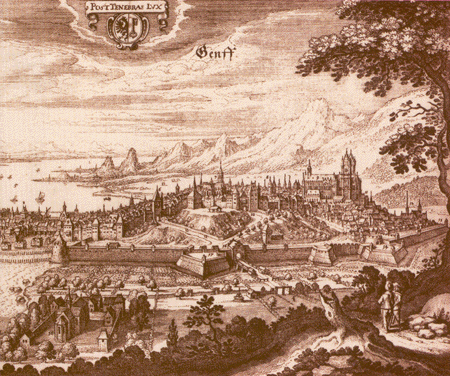4. Confessions from the Calvinist Reformation
After John Calvin had come in 1536 to Geneva, which as a free city did not belong to the Swiss Confederation (cf. lesson 3), he composed in the same year the First Geneva Catechism. The Catechism is essentially an extract from the first edition of Calvin’s Institutio Christianai Religionis (Institutes in the Christian honouring of God). The Geneva Confession of 1537, which was considered for a long time to have been written by John Calvin, is according to new research written by Wilhelm Farel, who Calvin had brought to Geneva. Comprising 21 articles, the Geneva Confession served as the basis of the Reformed doctrine in Geneva. As in Basel the (male) citizens had to consent to this confession on the basis of the decision of the council of 1537. This obligatory consent certainly caused annoyance in Geneva.

Geneva Engraving
Calvin was driven out of Geneva in 1538 and was called back in 1541 to bring the Reformation to completion. In the year 1542 Calvin replaced his first Geneva Catechism of 1536 by the French Geneva Catechism of 1542, which appeared in Latin in 1545. In 55 sections and 373 questions and answers it is above all geared towards the teaching of youth, but it also serves beyond this as a summary of the Reformed doctrine that was in force in Geneva. The Catechism of 1542/1545 became the decisive catechism of the French Reformed communities. It was translated into various languages and was also a model for the Heidelberg Catechism. In Geneva the Catechism remained in use until 1788.
From Calvin’s Geneva Catechism of 1542/1545 96. In what sense do you call the Church “holy”? 97. What is meant by the epithet “Catholic” or “Universal”? 98. And what is the purport of what immediately follows concerning
the “communion of saints”? 99. But is this holiness which you attribute to the Church
already perfect? *** Questions: 1. Calvin also offers a commentary on the Apostle’s Creed
in the section concerning the Church. What do you notice about
the wording in section 97 (particularly in distinction from the
Bern Theses of 1528)? 2. In what way is it important for Calvin that the Church be
given the attribute “holy”? 3. According to section 98 the goal of godly benefits (and that
also means gifts, talents, which are present in the community)
is communion with one another. What could this mean?
|
In the first few years of their existence the Protestant communities in France were not organised centrally and had no common doctrinal basis. When the dispute about the doctrine of election began in 1558, the desire for a common confession arose. At the secret national synod in Paris in 1559, at which delegates from 50 communities were assembled, the Confessio Gallicana (Confession de foy), which above all goes back to Calvin, and the related Church Constitution (Discipline ecclesiastique) were adopted. In 1569 the confession was endorsed at the synod of La Rochelle. It is therefore sometimes called “Confession of La Rochelle” or “French Confession.” The Confessio Gallicana had great influence first in France and after the flight of the Huguenots also in other parts of Europe.